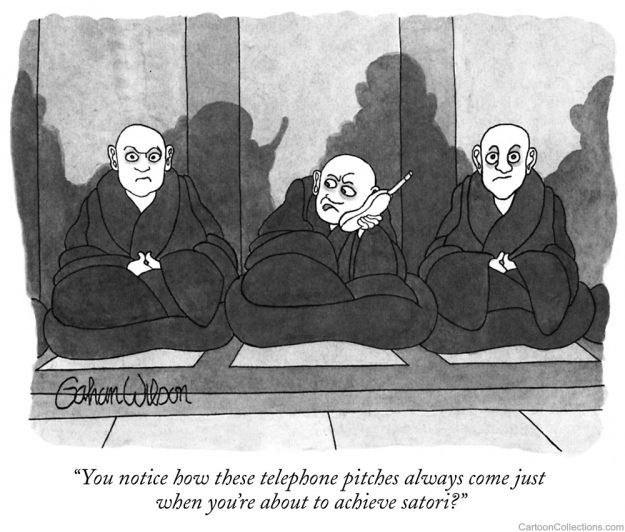Matthew Abraham’s exploration of the CBD (cannabidiol) craze, “Can CBD Give Your Meditation a Boost?,” sparked a lively debate about the use of non-psychoactive drugs as meditation aids. Allen Howell summed up many readers’ feelings with his response: “If you need to boost your meditation, you don’t understand meditation.” Others drew parallels between CBD and caffeine: Doug Percival commented, “There were probably ‘critics’ who questioned the use of green tea in Zen.” Payt Kritz posed the question, why not use CBD “if we can use psychiatric medicine like antidepressants without shame?” Nova Kongova asked whether American yogis and Buddhists are “aware that the Vedic religions praised cannabis since antiquity. . . . As many Buddhists interpret the five precepts, cannabis use outside of a defined medical context is plainly wrong,” yet “the religious use of cannabis is not only widespread but is plainly a sacrament” in Vedic traditions. “I wonder,” he concludes, “if we need to adopt a posture of cultural humility in respect to our appropriation of Indian religions.”
As the #MeToo movement continues to spur transparency in Buddhist communities, Tricycle has covered its developments, eliciting many reactions. In “Will Sanghas Learn from the Scandals in the Buddhist World?,” Wendy Joan Biddlecombe Agsar reviewed the allegations of sexual assault and ethical violations that have rocked Buddhist communities over the past years. Greta James noted that the issue of abuse in the sangha is also about the “failure of compassion for those women who spoke up and spoke out early about what was going on and weren’t believed, or worse” and hopes “that these unfortunate events usher in a new era of transparency, ethics, and accountability.” Reader “Tenpel” and others took issue with the article’s reference to Triratna [formerly Friends of the Western Buddhist Order] as a “good example on how to deal with abuse,” and cited ongoing sexual misconduct concerns within the organization. Matthew Abrahams wrote about the investigation of Shambhala International’s leader, Sakyong Mipham Rinpoche, in “Shambhala Investigation: Leader Sakyong Mipham Rinpoche Likely Committed Sexual Misconduct.” Margaret Langston responded: “I will never get over being sad about Shambhala. . . . I’m working very hard to separate all of the good experience being part of Shambhala from the very unfortunate actions of its leadership.” In “Attendants Paint a Picture of Shambhala Leader’s Harmful History,” Emma Varvaloucas reported on an open letter penned by six of Sakyong Mipham Rinpoche’s former attendants recounting abuse they witnessed and experienced. Vanessa Walker wondered “why [the attendants] didn’t speak up at the time.” Ty Muto replied, “People don’t always feel safe to come forward, or people come forward and aren’t believed. . . . Instead of asking why they didn’t speak up, maybe ask: what type of culture does Shambhala create where there could be confusion [about saying something], given this harm?” Days later Matthew Abrahams posted “Two Embattled Buddhist Leaders Pressured to Stop Teaching,” after Sakyong Mipham Rinpoche stepped back from teaching and Spirit Rock Meditation Center revoked Noah Levine’s authorization to teach. Chris Keegan was “sad to see this” but applauded “any organization that holds its leaders accountable for misusing their positions.”
“The Red Hat Rorschach Test” by Matthew Gindin responded to the widely debated Covington incident in Washington, DC, where Catholic high school students faced off against Native American activists, and encouraged readers to seek understanding instead of blame. Joshua Abell commented: “I was as outraged as anyone else when the first story came out. With more information, I realized the truth was more complicated. . . . Tribalism really does a number on objectivity.” Kris Rinearson felt that “only those involved know where their hearts were.”
In the interview “Re: Corporate Meditation” by Wendy Joan Biddlecombe Agsar, Mirabai Bush is adamant that a “nonjudgmental” stance is necessary if mindfulness meditation is going to be introduced into corporations. Such a see-no-evil stance was her rationalization for working with Monsanto, one of the most nefarious corporations on this planet—the producer of Agent Orange, GMOs, and Roundup, as well as a global exploiter of farmers. She admits, however, that she had no intention or expectation of “trying to change the corporation.” Her advocacy of corporate mindfulness programs was aimed at “changing the consciousness” of individuals. For Bush, corporate meditation is a privatized spirituality that requires no ethical stance or concern for the harm inflicted by such companies as Monsanto (now Bayer).
While teaching individual-level stress reduction practices to human beings may be a good thing, we shouldn’t expect that such programs will effectively address the structural and systemic sources of stress or call into question products and practices that are the cause of collective and environmental harm.
Yet corporate mindfulness teachers such as Bush often claim that individualized mindfulness programs are subversive, often evoking the metaphor of the Trojan horse. They speculate that over time, leaders, managers, and employees trained in mindfulness may wake up and effect major transformations in corporate policies and practices. Bush, for example, says at the conclusion of the interview, “Once a person is given an opportunity to explore the inner life, there is no predicting what he or she will find.”
Bush also states: “I would not enter a corporation that is doing things that are not within right livelihood, such as making weapons or mining coal.” However, she seems to have no issue with Google’s deceptive data mining practices (which allow it to share user profile data with advertisers) or the illegal tracking of smartphone users, as well as a long list of other privacy concerns. Bush resorts to a familiar trope: Ethical concerns are represented by mindfulness teachers who embody “the dharma.” Beholden and faithful to the power elite, mindfulness teachers are well-meaning, nonjudgmental corporate saints whose measures of corporate reform are anecdotal confessions from individuals (for example, the scientist who worked on Roundup). Twenty years later, Monsanto’s Roundup is still with us.
—Ron Purser
Professor of Management, San Francisco State University
The Question
The spiritual teacher Ram Dass keeps photos of both Barack Obama and Donald J. Trump on his altar. What challenging or inspiring contemporary figures do you hold in your practice?
My practice involves appreciation of whatever has deeply enriched my spiritual, intellectual, and aesthetic life, regardless of time frame. My altar includes images of Louis Armstrong, Charlie Parker, Bach, Shakespeare, Buddha, Tara, Socrates, and Abraham Lincoln. A pine cone and a rock represent nature, and a poem by Rumi and a Native American dream catcher flank either side of the altar. Who could ask for anything more?
—Charles Suhor
That’s cool, but I’m not ready to go there.
—John Grywalski, @PolishCarpenter
Before Trump, I used to practice forgiveness by holding Vice President Dick Cheney in loving consciousness and praying for his ailing heart. While I may disagree with Cheney, Trump, and others, they are a mirror reflecting my own shadow and ego
—David Forestier, @FLPollwatcher
Which one is challenging and which one is inspiring? I feel that awakening is an apolitical experience
—Robert Correa
That’s interesting. Gives me a peaceful feeling and option to think differently about my altar and what or who I’m holding in my practice. Thanks!
—Rebekah West, @rebequewest

For the next issue:
Tell us your retreat cheats. Do you sneak in a phone call or an evening snack? Email editorial@tricycle.org.
♦
To be considered for the next issue’s Letters to the Editor, send comments to editorial@tricycle.org, post a comment on tricycle.org, or tweet us at @tricyclemag by May 24, 2019.
Corrections:
“Shambhala Investigation” misattributed a claim of consensual encounter to one of the women interviewed in Shambhala’s investigation of sexual misconduct allegations against the Sakyong. It was the Sakyong who said the encounter was consensual, not the victim; the investigator determined that the encounter was nonconsensual. We regret the error.
Thank you for subscribing to Tricycle! As a nonprofit, we depend on readers like you to keep Buddhist teachings and practices widely available.
